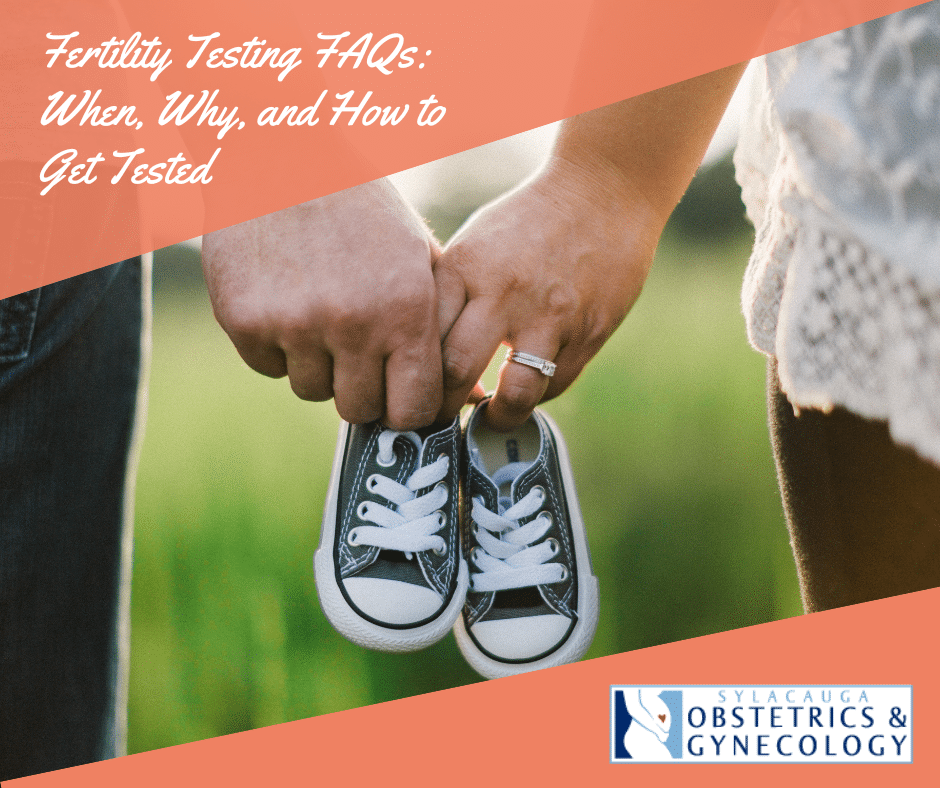
22 Mar Fertility Testing FAQs: When, Why, and How to Get Tested
The decision to start a family is enormously exciting. And for many couples, getting pregnant happens rather quickly after that decision is made. About 85% of American couples get pregnant within the first year of trying. But for the remaining 15%—which translates to millions of hopeful people who want to be parents—things aren’t so easy. If this sounds familiar, fertility testing can help.
At Sylacauga OB-GYN, we understand that fertility is more than just a numbers game. Every patient who comes to us for fertility counseling has hopes, dreams, and aspirations tied to their family plans. That’s why we’re here to answer your most pressing questions about the process and do everything in our power to increase your chances of conceiving a child.
What is fertility testing?
Infertility doesn’t just have one cause. Your difficulties could be influenced by you or your partner’s lifestyle, genes, medications, or any number of other factors. So, to determine the root cause, we’ll need to run several different tests.
The process will begin with a conversation. We’ll talk about your sexual and medical history as well as any problems you may have noticed with your menstrual cycle. We’ll also talk about any past pregnancies you’ve had, as well as current medications, overall health and wellness, and more.
Tests we may order or include:
- Blood tests, including thyroid function tests to check your hormone levels or ovarian reserve testing to determine the number of eggs you have remaining
- Ultrasound to evaluate the shape and condition of your reproductive organs
- Hysterosalpingogram (HSG) x-ray procedure to see if your fallopian tubes are blocked
- Semen analysis for your partner to determine their sperm count and condition
Some tests will be performed periodically to optimize your fertility journey:
- Urine tests to help time and predict ovulation via hormone measurements
- Basal body temperature to track ovulation over time
How is infertility diagnosed?
We use your test results to evaluate your hormone levels, the condition of your partner’s sperm, and the physical shape and condition of your uterus (womb), ovaries, and fallopian tubes. These tests and conversations will help us determine whether your difficulties are related to lifestyle or physiological issues.
When we get the results, we’ll sit down together to discuss our findings and put together a tailored plan for treatment. If we discover sperm abnormalities in your partner, we can refer them to a urologist who specializes in infertility.
What are common causes of infertility in men and women?
For both men and women, the risk of infertility increases with age. Other factors that affect all people include:
- Use of tobacco and/or drugs such as marijuana
- Use of alcohol
- Being overweight or significantly underweight
- Exposure to certain toxic materials (often at work)
- Sexually transmitted diseases
- Stress
The most common cause of infertility in women is a failure to ovulate, accounting for about 40% of cases. This may happen because of a gynecological condition like polycystic ovary syndrome (PCOS), a hormone issue like thyroid imbalance, or any of the lifestyle factors listed above.
For men, the most common issue is low or abnormal sperm production. They may not produce enough sperm, or it may be an issue of quality—irregular shape and decreased motility (ability to move) are common.
What are the different types of fertility treatments available?
Many people think infertility means they can never have a child. But fortunately, that isn’t always the case. You have options, and your OB-GYN will be there to guide you toward an informed decision.
Fertility Medications
Certain medications can help regulate your hormones and encourage ovulation. The most common, known as clomiphene citrate, is a pill that stimulates ovulation. There are also injectable medications known as gonadotropins that trigger and regulate hormones related to ovulation. Several other fertility drugs may also be considered, depending on your medical history.
Fertility Restoring Surgery
In some situations, we may recommend laparoscopic surgery to identify and treat certain physical anomalies. For instance, laparoscopies are the only way to diagnose endometriosis. We can also use this procedure to remove some fibroids, correct certain problems with uterine anatomy, and more.
Reproductive Assistance
Most people are familiar with intrauterine insemination (IUI) and in vitro fertilization (IVF) procedures. IUI is when healthy sperm are introduced to the uterus around the time of ovulation. IVF involves fertilizing a mature egg with healthy sperm outside of the uterus in a lab, then transferring the fertilized eggs to the uterus.
While we do not offer IUI or IVF at Sylacauga OB-GYN, we are happy to answer questions about these procedures, help you understand whether they could be right for you, and support you as we determine next steps.
When should I consider seeing a fertility specialist?
If you are under 35 and have been trying to get pregnant for over a year, or over 35 and have been trying for 6 months, schedule a fertility consultation with Sylacauga OB-GYN! This is an important first step toward addressing your family planning challenges.
Our approach to fertility testing is comprehensive, compassionate, and supportive. You’ll meet with us often so that we can make any necessary adjustments to your treatment plan and discuss any challenges or concerns you have along the way.
And because we’re right here in your own backyard, you won’t have to worry about disrupting your life for an hours-long drive every time. We’re standing by to support you and your goals of starting a family from beginning to end!
Fertility Testing in Sylacauga: Serving Women in the Coosa Valley Area
If you think you may be experiencing fertility issues, or if you know there is a history of infertility in your family, schedule an appointment with Sylacauga OB-GYN today. Our trusted fertility doctors are ready to consult with you and determine the cause of your struggles today. Give us a call at (256) 487-7783 or request a fertility consultation online.


